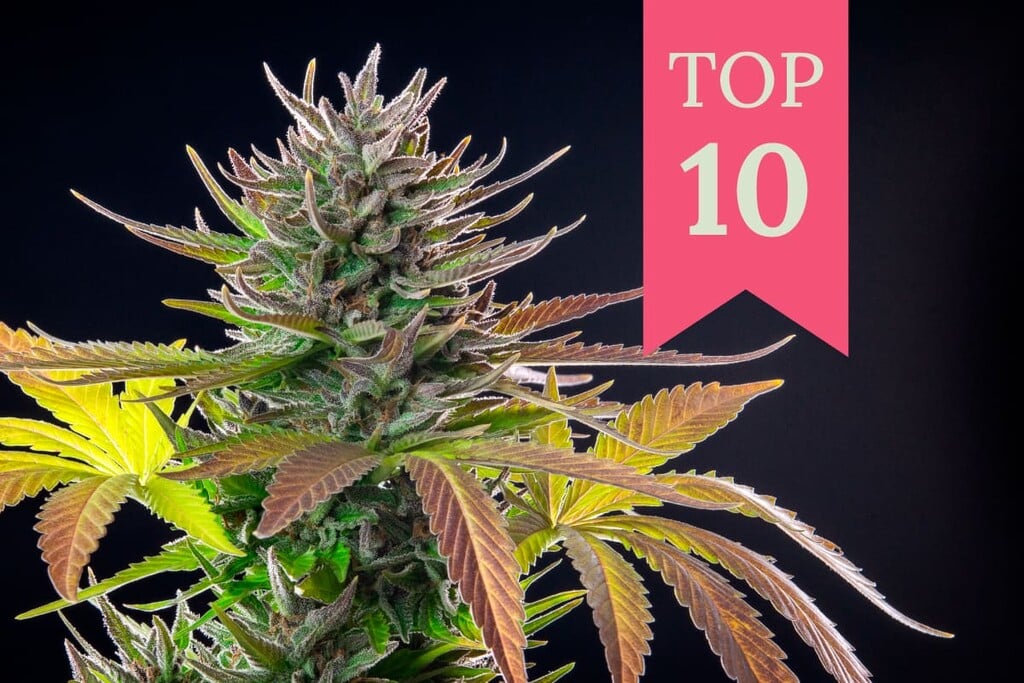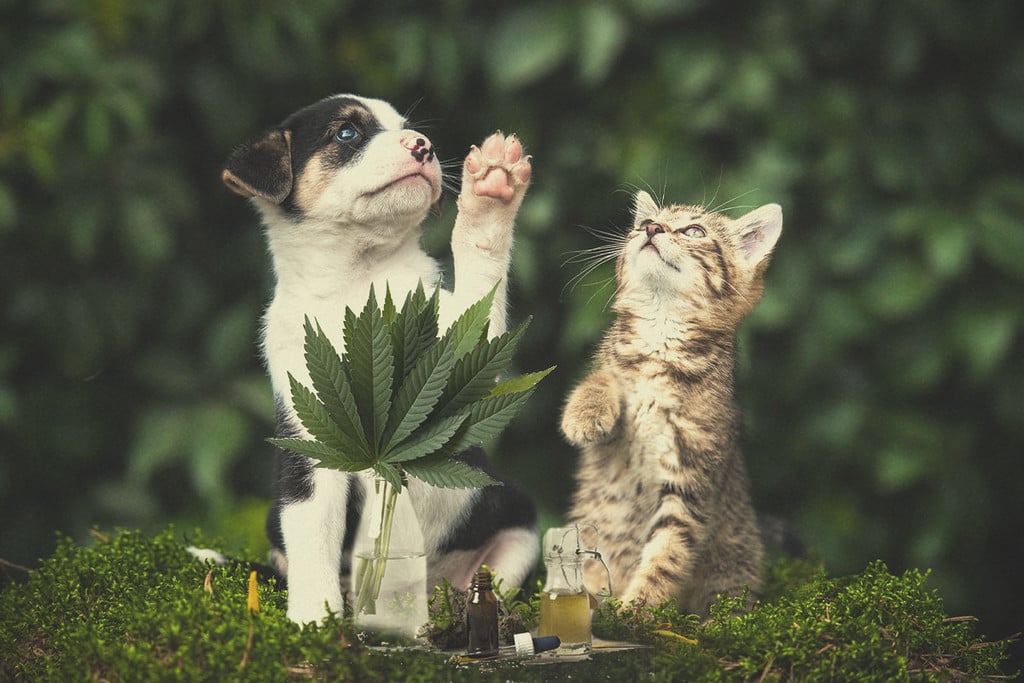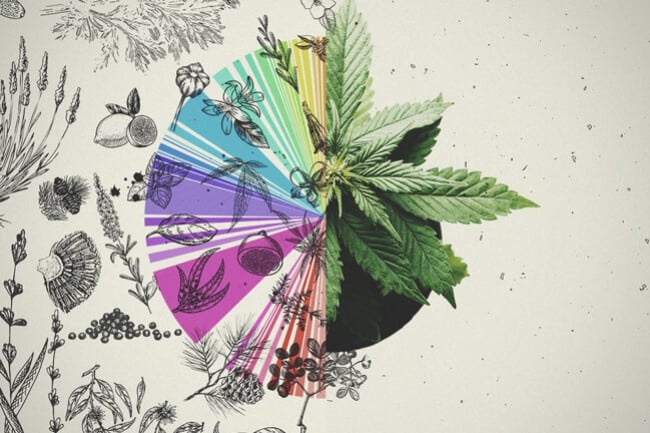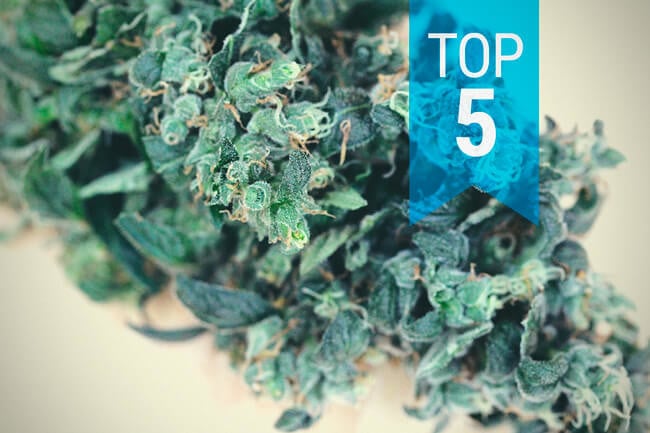.
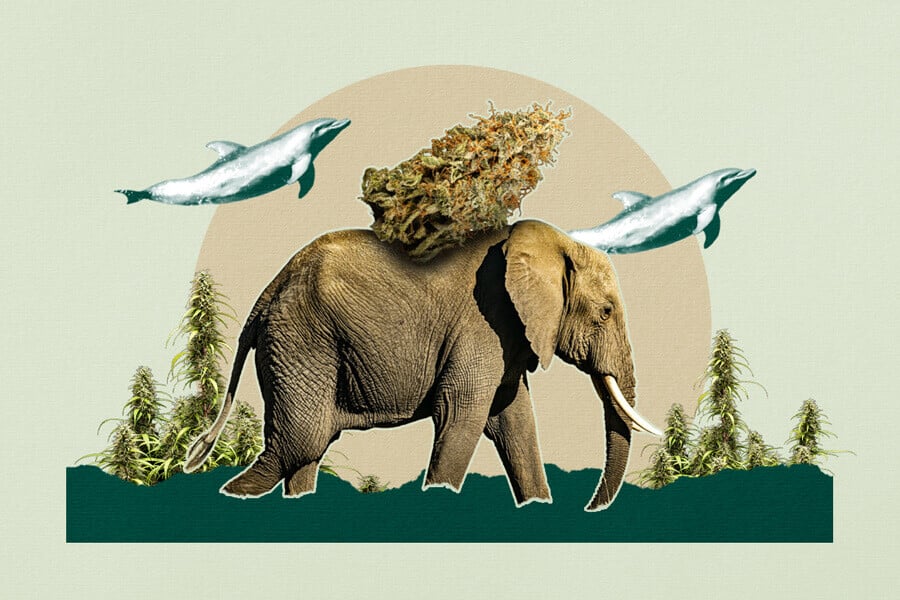
Do Animals Get High?
Reindeer munching on mushrooms? Wallabies ingesting opium? Elephants slurping litres of booze? Fruit flies getting tipsy? No, you're not tripping. These are all observed behaviours of these fascinating creatures. Discover 5 animals that seem to enjoy getting high in their downtime.
Contents:
Humans have gotten high for thousands of years, we still get high, and we’ll continue to get high for as long as we’re around. But we’re not the only species that uses plants, fungi, and other animals to experience altered states of consciousness. Discover the animals that get high on purpose—and those that get blasted by accident—below.
Animals: Do They Like Getting High?
Animals do all kinds of weird and wonderful things. We humans can sometimes erroneously believe the creatures we share our planet with are rather simple and unintelligent. But this couldn’t be further from the truth! While we don’t see what they get up to most of the time, researchers and photographers have captured and documented truly jaw-dropping animal behaviour.
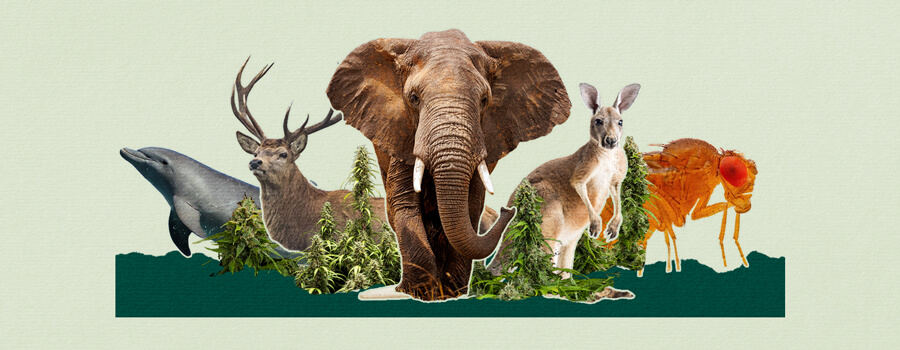
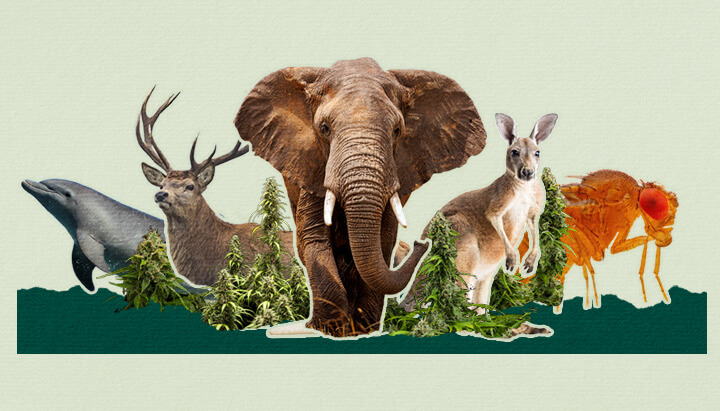
For example, did you know that ant colonies actively farm aphids[2] for their sugary excretions and grow fungal gardens[1] underground? What about the fact that the sleepy chinstrap penguin takes an average of 10,000 second-long micro naps[3] each day? Likewise, honeybee scouts are known to perform a “waggle dance”[4] when they return to the hive, which communicates the precise location of a nectar discovery, and orcas essentially perform surgery on their great white shark prey by expertly extracting their livers.
If any of those facts blew your mind, wait until you hear this one: some animals like to get high. You read that right. Some animals intentionally seek out certain substances in order to trigger an altered state of consciousness. Much like some humans will take a trip down to the pub for a cold pint or roll themselves a joint on the comfort of their own couch to feel elevated, some animals also seem drawn to particular plants, mushrooms, and other animals to achieve a similar effect.
While some species are known to revel in the effects of trippy compounds, in certain other animals this behaviour remains speculation. For example, the idea that koalas get stoned every time they munch down on eucalyptus leaves—a staple food in their diet—is false[5]. It’s also harder to tell if some wild animals actually seek out an altered state of consciousness compared to our domesticated furry friends, owing to the simple fact that we’re not observing them all the time.
Do These 5 Animals Really Like to Get High?
Animals that actively ingest mind-shifting compounds likely experience a “high” similar to that experienced by humans under the influence of cannabis, mushrooms, and other psychoactive substances.
Certain naturally occurring molecules are known to act on the central nervous system of certain animals, transiently changing the way their senses interpret external stimuli, resulting in a kind of “trip”.
So, which animals get high on purpose, and which by accident? And which cases of animals getting stoned are mere myths? Continue reading to find out!
-
Dolphins and Pufferfish
Dolphins are truly fascinating creatures. These friendly aquatic mammals exhibit a range of complex behaviours. Infant dolphins are able to learn their names[6], communicated in whistles, from their mothers and retain the information for the rest of their lives. They also have exceptionally large brains, with a brain ratio ranking just below that of humans. So, how do our adorable flippered friends put all of their grey matter to use? Well, in between executing complex hunting strategies[7], they appear to enjoy getting high.
Marine biologists have observed dolphins playing with and passing around pufferfish, a species highly poisonous to human beings. However, the toxins inside these animals appear to have a narcotic effect on dolphins. While studies haven’t explored whether or not these chemicals induce a psychoactive experience in dolphins, some are convinced that they get high when passing the pufferfish to the left-hand side.
-
Reindeer and Mushrooms
Reindeer “have a desire to experience altered states of consciousness”. These are the words of scientist Andrew Haynes penned in the Pharmaceutical Journal. But what evidence underpins such a profound statement? It appears reindeer go to considerable lengths to search their natural range—the boreal forests and tundra of northern Europe, North America, Greenland, and Iceland—to seek out the famous red and white mushroom that features in countless fairytales. Known by the common name fly agaric and the Latin binomial Amanita muscaria, this mushroom contains several psychoactive compounds, including ibotenic acid and muscimol. These compounds induce an altered state by interacting with GABA receptors in the brain.
Observers have witnessed reindeer chowing down on this fungus. Shortly afterwards, they start to exhibit behaviour described as drunkenness—they dart around aimlessly, make odd noises, and their heads start twitching.
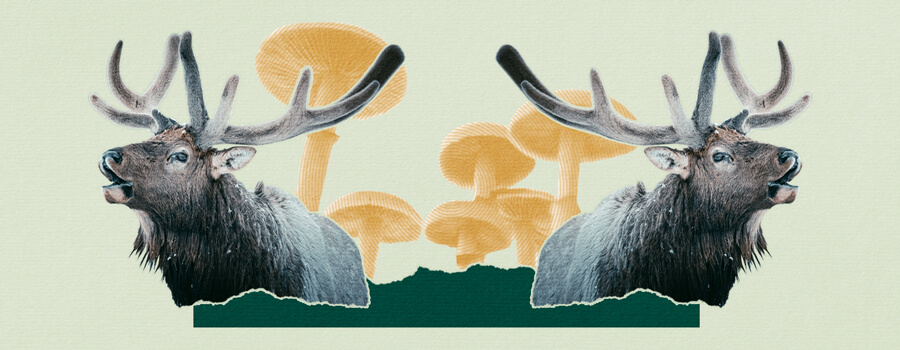
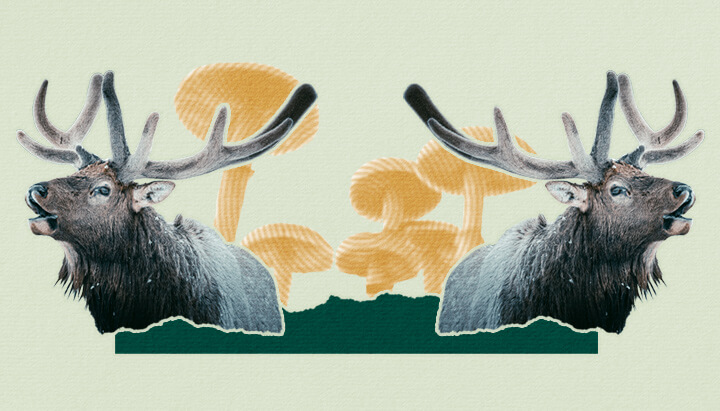
-
Fruit Flies and Alcohol
Ah, the humble fruit fly. Small, short-lived, and simply quite annoying, these creatures are of little interest to most people. Also known as Drosophila melanogaster, this species dwells around dumpsters, rubbish bins, and countertop fruit bowls. But fruit flies aren't drawn to fresh pears and crisp apples. No, they prefer the rotted and overly ripe stuff. Because fruit is packed with sugar, it naturally ferments with age. Therefore, you could say that fruit flies have a rather booze-heavy diet.
Because fruit flies and humans have very different nervous systems, scientists aren’t exactly aware of the effect that alcohol has on their bodies. However, researchers have observed that male fruit flies develop a much higher preference for booze[8] after getting rejected by females when attempting to mate.
-
Wallabies and Opium
If wallabies could talk, they’d probably say something like: “Leave the booze for the fruit flies and the mushrooms for the reindeer—we’re into the hard stuff”. Why? Because these medium-sized marsupials, native to Australia, have a penchant for poppies. Sure, the image of these pouched mammals roaming through flower meadows seems innocent enough. But they’re not there to look cute; they’re there to get a fix of derivatives including morphine, codeine, and heroin.
Okay, maybe they’re not intentionally seeking out some of the most powerful plant-derived compounds on the planet. But they certainly feel the effects when grazing in the large poppy fields of Tasmania. Farmers have witnessed hungry wallabies getting high[9] and bouncing in circles after consuming poppy seed heads loaded with narcotics.
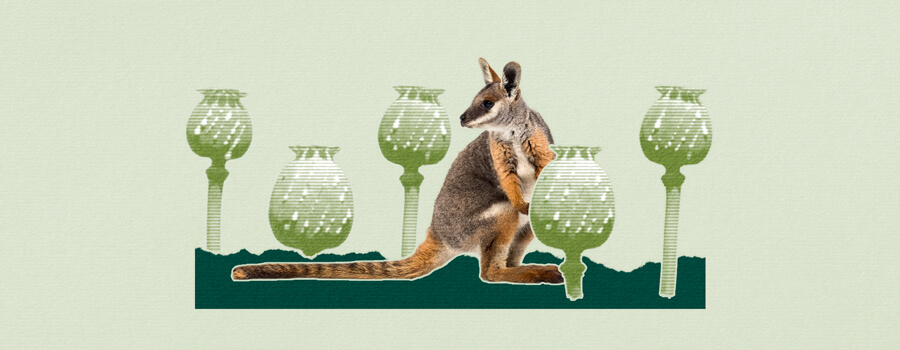
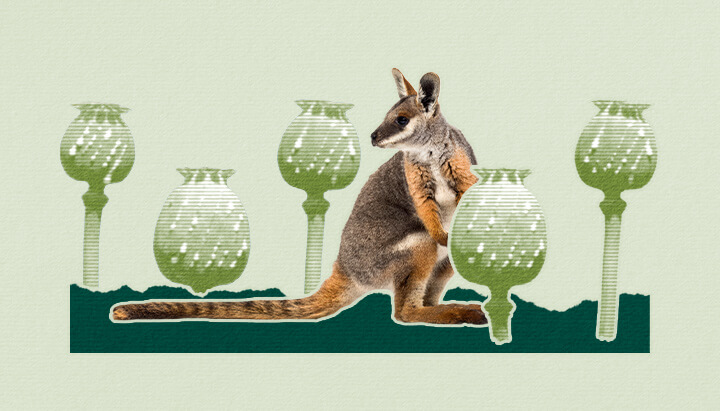
-
Elephants and Fermented Fruit Juice
For centuries, a myth has circulated that elephants enjoy getting drunk by eating the fermented fruits of the marula tree. The thought of a drunken elephant is both humorous and intimidating, but does this massive mammal actually enjoy a tipple or two?
Elephants certainly do consume fermented fruits, and fermented fruits contain alcohol. However, elephants are massive creatures. Because of this, they require around 1.9 litres[10] of pure ethanol to get drunk. Now, elephants are able to eat around 1–2% of their body weight in a single day, meaning they’d consume roughly 714 fruits if eating marulas alone. However, this amount would only provide around 50% of the ethanol content required for drunkenness.
While drunkenness in elephants seems unlikely, researchers have found a means by which it could occur. The possession of the ADH7 gene could mean that elephants have a harder time breaking down ethanol, making them more susceptible to its effects and vindicating the long-standing myth surrounding these potentially tipsy titans.
What About Cats and Catnip?
We’ve all heard the absolute banger “Ev’rybody Want to Be a Cat”, performed by a group of ragtag and seemingly inebriated felines on the rooftops of Paris. It's certainly an attractive proposition. They spend a lot of time sleeping, have superhero senses, and even enjoy getting royally stoned from time to time. When it comes to cats, their drug of choice is the aptly named catnip plant.
Known by the Latin binomial Nepeta cataria and belonging to the mint family, this herb contains a compound called nepetalactone. Cats experience stimulating effects from this plant, causing them to start rolling, flipping, meowing loudly, and even rubbing their face and body in their drug of choice. While most cats can experience the joys of catnip, it has no effect on around 20% of them due to genetic factors.
Humans Aren’t the Only Animals That Like to Get High
Humans have sought out psychoactive substances, from fermented liquids and herbs to fungi and animal toxins, since antiquity. But as we now know, the likes of reindeer, cats, and fruit flies also seemingly get high on purpose. A range of species, including wallabies and dolphins, are also thought to get high, whether as a side effect of playing and foraging or inspired by more purposeful motives. Keep in mind, while these are some of the better-known cases, there could be many other animals out there getting blasted that we don’t know about yet!
- Farmer ants and their aphid herds | Office for Science and Society - McGill University https://www.mcgill.ca
- Ant Gardens | USU https://www.usu.edu
- These penguins nap 10,000 times a day, for seconds at a time https://www.snexplores.org
- Bee Waggle Dance - Introduction | Ask A Biologist https://askabiologist.asu.edu
- 10 Interesting facts about koalas | WWF-Australia | 10 Interesting facts about koalas | WWF Australia https://wwf.org.au
- How intelligent are whales and dolphins? https://uk.whales.org
- How dolphins use tools, teamwork, and trickery to get their dinner https://www.nationalgeographic.com
- Sexually Rejected Flies Turn to Booze https://www.science.org
- Bennett's wallabies get high on poppy seeds - Australian Geographic https://www.australiangeographic.com.au
- The Myth Of Elephants Drunk On Marulas https://www.krugerpark.co.za


























